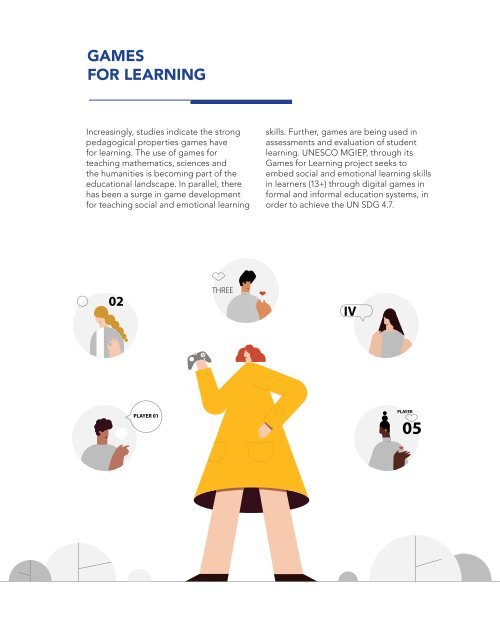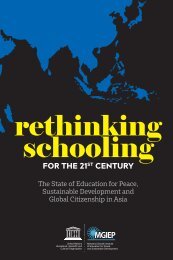UNESCO MGIEP's Annual Report 2019
2019 was a critical year for the Institute - with various products rolling out to pilot and implementation stage. Read the Institute's Mission-based Annual Report on the impact the Institute made during the year, as it works towards achieving the UN SDG 4, Target 7.
2019 was a critical year for the Institute - with various products rolling out to pilot and implementation stage. Read the Institute's Mission-based Annual Report on the impact the Institute made during the year, as it works towards achieving the UN SDG 4, Target 7.
You also want an ePaper? Increase the reach of your titles
YUMPU automatically turns print PDFs into web optimized ePapers that Google loves.
GAMES<br />
FOR LEARNING<br />
Increasingly, studies indicate the strong<br />
pedagogical properties games have<br />
for learning. The use of games for<br />
teaching mathematics, sciences and<br />
the humanities is becoming part of the<br />
educational landscape. In parallel, there<br />
has been a surge in game development<br />
for teaching social and emotional learning<br />
skills. Further, games are being used in<br />
assessments and evaluation of student<br />
learning. <strong>UNESCO</strong> MGIEP, through its<br />
Games for Learning project seeks to<br />
embed social and emotional learning skills<br />
in learners (13+) through digital games in<br />
formal and informal education systems, in<br />
order to achieve the UN SDG 4.7.<br />
• In <strong>2019</strong>, the Institute designed a digital SEL curriculum for its<br />
indigenously developed game, World Rescue. Additionally, SEL<br />
Learning Modules were designed for four existing “commercialoff-the-shelf”<br />
games, titled Bury Me My Love, Gris, This War Of<br />
Mine And Florence, all of which are available on FramerSpace.<br />
• Teachers from 8 universities in 6 countries (India, Bangladesh,<br />
Bhutan, Nepal, Sri Lanka and Japan) were trained to implement<br />
and pilot test Cantor’s World, a game designed to educate<br />
teachers and learners about the Inclusive Wealth Index.<br />
• In collaboration with the Communication and Information<br />
and Education sectors of <strong>UNESCO</strong>, the Permanent Delegation<br />
of Finland, the Ministry of Human Resource Development,<br />
Government of India and its key technology partners, Samsung,<br />
India and Hatch Entertainment Global, the Institute set up<br />
a Gaming Zone at the 40 th <strong>2019</strong> <strong>UNESCO</strong> General Conference<br />
in Paris, France for 11 days. This initiative was a part of<br />
Media Information Literacy and Digital Gaming side event<br />
at the General Conference and saw attendance and hands on<br />
experience by over 200 participants.<br />
• At the 40 th <strong>2019</strong> <strong>UNESCO</strong> General Conference, the Draft<br />
Guidelines for Digital Learning Applications were launched by<br />
the Minister of Human Resource Development, Government of<br />
India, Shri Ramesh Pokhriyal ‘Nishank’. The Draft Guidelines<br />
were developed to identify digital learning experiences that<br />
would support and assist developers, designers, students,<br />
teachers, parents and administrators—in their efforts to<br />
develop or select high-quality, credible, and appropriate gaming<br />
and digital learning applications.<br />
ANNUAL REPORT <strong>2019</strong><br />
MYDREAM PROJECT<br />
In response to the Ministry of Human Resource<br />
Development, Government of India’s request<br />
to reduce stress and depression among young<br />
learners, in 2018, <strong>UNESCO</strong> MGIEP designed<br />
a two year research pilot to use project based<br />
and social emotional leaning interventions,<br />
facilitated by digital pedagogies. This project<br />
was conducted in collaboration with a unique<br />
network of over 500 residential, regional<br />
government schools for grades 6-12. Further,<br />
Samsung India provided the technology<br />
and funding through a grant to support the<br />
study. A final report assessing whether these<br />
interventions significantly achieved reduction<br />
of curriculum stress and improved learning<br />
outcomes will be made available at the end of<br />
the two year pilot, in 2020.


















